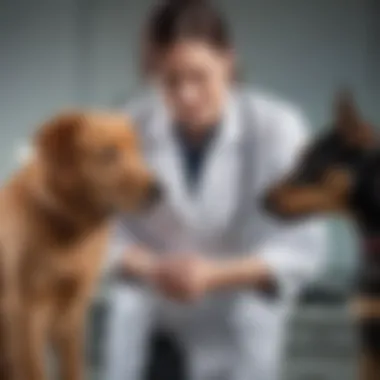Sudden Diarrhea in Pets: Causes and Management Guide


Intro
Sudden diarrhea in pets is a common concern among pet owners. Understanding its causes and symptoms can help owners take effective action. While it may seem trivial, this condition can be associated with more serious health issues. Therefore, knowing how to identify and manage sudden diarrhea is crucial for the well-being of pets.
Understanding Your Pet
Breed Traits
Different breeds may have unique predispositions towards certain health issues, including sudden gastrointestinal disturbances. For example, some small breeds like Yorkshire Terriers may be more susceptible to dietary changes, while larger breeds might have specific digestive concerns. Understanding these traits can help pet owners anticipate issues.
Common Temperaments
The temperament of pets can also be linked to their health. An anxious pet may be more prone to gastrointestinal upset. Stressful changes in the environment, such as moving or introducing new pets, can lead to sudden diarrhea. Owners should monitor their pet's behavior closely.
Special Needs
Pets with certain medical conditions may require special attention. For instance, pets with food allergies or sensitive stomachs can be particularly vulnerable to dietary indiscretions. Identifying these special needs is essential for maintaining their health and preventing sudden diarrhea.
Pet Care Essentials
Nutrition and Feeding Guidelines
Proper nutrition is vital to preventing sudden diarrhea. A sudden change in diet can be problematic. When introducing new food, it should be done gradually. High-quality commercial diets, such as Royal Canin or Hill's Science Diet, can support digestive health.
Grooming Tips and Techniques
Regular grooming may also help in maintaining health. Keeping pets clean and free of parasites is important. Bathing and brushing should be part of a pet's routine to improve overall hygiene.
Health and Wellness
Regular veterinary check-ups help in early detection of potential health issues, including those that may cause diarrhea. Vaccinations and preventive treatments should never be overlooked. Regular wellness assessments are crucial in keeping pets healthy.
Training and Behavior
Basic Training Techniques
Training your pet can reduce anxiety and behavioral issues that may lead to gastrointestinal upset. Basic commands help in establishing a routine that can ease stress in pets.
Behavioral Problems and Solutions
If a pet displays signs of stress or anxiety, finding appropriate strategies is key. Behavioral modifications through positive reinforcement can be useful in alleviating such issues.
Mental Stimulation Activities
Keeping pets mentally stimulated is also vital. Engaging activities reduce anxiety and can prevent stress-induced diarrhea. Puzzle toys and interactive games can be helpful in providing that stimulation.
Engaging with Your Pet
Interactive Games and Toys
Choosing the right games is important. Interactive toys can promote engagement and help reduce anxiety. This leads to a healthier pet overall.
Safe Outdoor Activities
Safe outdoor activities allow pets to explore while getting exercise. This can contribute to better digestion and overall health. Walking or visiting pet-friendly parks can improve their quality of life.
Family-Friendly Pet Interactions
Involving the whole family in pet care and interaction fosters a strong bond. Positive interactions contribute to a pet's emotional well-being, which can mitigate stress-related health issues.
Pet Adoption and Integration
Choosing the Right Pet for Your Lifestyle
When adopting a pet, consider lifestyle factors. Some pets may require more attention or specific care. This ensures that both the pet and the owner will thrive.


Preparing Your Home for a New Pet
Creating a comfortable environment for a new pet is necessary. Prepare a safe space to help ease the transition.
Tips for Smooth Preface
Introduce pets to their new home gradually. Allowing time to adjust will minimize stress, potentially preventing health issues such as sudden diarrhea.
Understanding the underlying causes of sudden diarrhea in pets enables owners to respond swiftly. Early intervention can prevent serious health complications and foster long-term health.
By recognizing these aspects of pet care, owners are better equipped to manage sudden diarrhea and ensure a healthy life for their pets.
Intro to Sudden Diarrhea
Sudden diarrhea in pets is a condition that many pet owners may face at some point. Understanding this topic is critical not only for addressing immediate health concerns but also for ensuring the overall well-being of pets. Diarrhea can be a symptom of various underlying issues, making it important for pet owners to recognize the signs and seek appropriate care.
Definition and Significance
Diarrhea is defined as an increase in the frequency, volume, or fluidity of stool. It can be acute, meaning it develops suddenly, or chronic, lasting for an extended period. The significance of sudden diarrhea is rooted in its potential causes, which can range from benign dietary indiscretion to severe infections or illnesses. The rapid onset often alarms pet owners, making awareness of the condition's implications vital. Understanding the nature of sudden diarrhea enables pet owners to respond effectively, potentially preventing more severe complications from occurring.
Prevalence Among Pets
Sudden diarrhea is relatively common among household pets, particularly dogs and cats. Studies suggest that a significant percentage of pets experience digestive upset within their lifetime. Factors contributing to this prevalence include:
- Diet Changes: Introduction of new foods or treats.
- Infections: Bacterial or viral agents affecting gastrointestinal health.
- Environmental Factors: Stress, travel, or exposure to toxins.
- Parasites: Presence of worms or other gastrointestinal parasites.
Awareness of these triggers can aid pet owners in making informed choices about their pets' diets and environments. With timely intervention, most cases of sudden diarrhea are manageable, though understanding its prevalence helps prepare owners for effective care.
Anatomy of the Digestive System in Pets
Understanding the anatomy of the digestive system in pets is essential for grasping how sudden diarrhea can occur. The digestive system plays a critical role in the overall health and well-being of animals. It is responsible for breaking down food, absorbing nutrients, and eliminating waste. Any disruption in this system can lead to gastrointestinal issues, including diarrhea.
Overview of Gastrointestinal Tract
The gastrointestinal tract in pets consists of several key components that work together to process food. This includes the mouth, esophagus, stomach, small intestine, large intestine, and anus. Each part has a specific function. For example, the mouth is where food intake happens. Here, mechanical digestion begins with chewing, and enzymes in saliva start breaking down food.
Once the food travels down the esophagus, it reaches the stomach, where gastric acids further digest it. The small intestine is the main site for nutrient absorption. It consists of three sections: the duodenum, jejunum, and ileum. The large intestine, or colon, is responsible for absorbing water and forming stool. Any malfunction in this tract can lead to various health issues, including sudden diarrhea.
Key Points:
- The gastrointestinal tract is vital for digestion and nutrient absorption.
- Each part of the tract serves a unique function.
- Disruptions in the tract can trigger gastrointestinal problems.
Role of Gut Flora
Gut flora, or gut microbiota, refers to the community of microorganisms residing in the gastrointestinal tract. In pets, these microbes play a crucial role in digestion and immune function. A balanced gut flora helps in breaking down complex carbohydrates, producing essential vitamins, and protecting against harmful bacteria.
Disruption in gut flora can result from various factors such as dietary changes, antibiotic use, or infections. This imbalance can lead to digestive issues, including diarrhea. Maintaining a healthy gut flora is important to prevent gastrointestinal disturbances.
Important Considerations:
- Gut flora contributes to digestion and immune health.
- Imbalance of gut microbes can cause diarrhea.
- Factors such as diet and medication can affect gut flora.
Regular check-ups with a veterinarian can help monitor your pet’s digestive health and gut flora balance.
In summary, understanding the anatomy of the digestive system and the role of gut flora in pets is fundamental for addressing issues like sudden diarrhea. Awareness of these elements allows pet owners to better manage and respond to their pets' health challenges.
Common Causes of Sudden Diarrhea
Understanding the common causes of sudden diarrhea in pets is crucial for pet owners. It allows them to identify potential triggers quickly and takes appropriate actions. Sudden diarrhea can lead to dehydration, nutrient loss, and more severe health problems if not managed properly. By knowing the underlying causes, owners can make informed decisions and potentially prevent future episodes.
Dietary Indiscretion
Dietary indiscretion refers to the pet's tendency to consume inappropriate foods. Pets may eat spoiled food, foreign objects, or a sudden change in diet. For example, a dog may snatch a piece of food from the trash, which can upset its stomach. This type of diarrhea often occurs suddenly and can vary in severity. It is essential for owners to be aware of their pet's eating habits and diet changes. Adjusting their food gradually can help prevent upset stomach from sudden dietary changes.
Infections: Bacterial, Viral, and Parasitic
Infections are significant contributors to sudden diarrhea in pets. Bacterial infections can arise from consuming contaminated food or water, such as Salmonella or E. coli. Viral infections, like parvovirus in dogs, require urgent attention. Moreover, parasitic infections from worms or protozoa can also lead to this health issue. Pets showing these signs might experience not only diarrhea but also vomiting and lethargy. Proper veterinary diagnostics are vital in these cases. Treating infections swiftly can mitigate complications.


Illness and Disease
Underlying illnesses can cause sudden diarrhea in pets. Conditions like pancreatitis or inflammatory bowel disease may seem less obvious but require attention. Pets suffering from chronic diseases often exhibit diarrhea as a symptom rather than the main issue. Therefore, regular veterinary check-ups are crucial. Identifying these illnesses early ensures that proper treatment is administered and helps maintain your pet's overall health.
Stress and Behavioral Factors
Lastly, stress plays a pivotal role in causing sudden diarrhea. Changes in the environment, such as moving houses, new family members, or changes in routines can disturb a pet's digestive system. Additionally, anxiety can trigger stress-induced diarrhea. Owners should observe their pets for signs of anxiety and implement calming measures as needed. Creating a stable environment can be beneficial in reducing these stressors.
Regular monitoring of a pet's dietary habits and lifestyle changes can prevent many cases of sudden diarrhea.
By understanding these common causes of sudden diarrhea, pet owners can be more proactive. Whether through dietary management, hygiene practices, or addressing health issues, awareness is the first step in effective care.
Symptoms Accompanying Sudden Diarrhea
Understanding the symptoms that accompany sudden diarrhea in pets is essential for accurate diagnosis and timely intervention. This section provides insights about how to recognize these symptoms effectively. It mainly focuses on the significance of identifying the type of diarrhea and noting any additional physical signs your pet may exhibit. Recognizing these factors can help you determine the appropriate management steps and when to consult a veterinarian.
Identifying Diarrhea Types
Not all diarrhea is the same. Pets can experience various types of diarrhea based on the underlying cause. Identifying the type can assist in understanding the severity and possible treatments. Common types include:
- Acute Diarrhea: This form comes on suddenly and can last for a short duration. It is often linked to dietary indiscretion or infections.
- Chronic Diarrhea: This persists longer than a few weeks. It may indicate an underlying health issue or dietary intolerance.
- Watery Diarrhea: This is characterized by a high water content. It often suggests a gastrointestinal disturbance caused by infections or toxins.
- Bloody Diarrhea: This can range from dark, tarry stools to bright red blood. It is often serious and requires immediate veterinary attention.
Monitoring the consistency and characteristics of your pet's stool can offer useful clues. Displaying vigilance regarding these variations helps in swiftly addressing potential health threats.
Accompanying Physical Signs
Beyond diarrhea itself, pets may show other physical symptoms that warrant attention. Observing these signs can give you a clearer picture of your pet's overall health. Some common physical signs include:
- Vomiting: Frequent vomiting alongside diarrhea is a red flag. It can indicate severe gastrointestinal distress or infection.
- Lethargy: A noticeable lack of energy can suggest your pet is not well. Lethargy often accompanies gastrointestinal issues.
- Abdominal Pain: Pets may exhibit signs of discomfort, such as whining, refusing to be touched, or adopting unusual postures.
- Fever: An elevated temperature could indicate an infection or other health concerns. Monitoring your pet's body temperature can be critical during episodes of diarrhea.
Recognizing these accompanying signs is crucial for your pet's health and can guide decisions regarding treatment or veterinary visits.
Actively watching for these symptoms and seeking help when necessary can provide your pet with the best chance at recovery. These observations empower owners to make informed choices regarding their pet's health management.
Diagnosis of the Underlying Cause
Understanding the reasons behind sudden diarrhea in pets is vital for effective treatment. Identifying the underlying cause can prevent further health complications and assist in managing your pet’s condition more efficiently. Each pet's digestive system can react differently to various triggers. Thus, pinpointing the exact issue can greatly influence treatment options and outcomes, ensuring that your pet receives tailored care.
Veterinary Examination
A thorough veterinary examination is often the first step in diagnosing the cause of sudden diarrhea. During this exam, a veterinarian will evaluate the pet's overall health and gather comprehensive information. This can include:
- Medical history: Information about your pet's diet and recent changes, vaccination status, and previous health issues helps narrow down potential causes.
- Physical assessment: The vet will perform a physical exam, checking for signs of dehydration, abdominal pain, or other abnormalities. This helps them determine if the diarrhea is a symptom of a more serious condition.
- Behavioral observations: Noting any changes in your pet's behavior or activity levels can provide additional insights. Pets often exhibit changes in appetite and energy that can aid in diagnosing the problem.
Veterinary examinations establish a foundation for subsequent steps, ensuring a more accurate diagnosis and effective treatment plan.
Laboratory Testing
In certain cases, laboratory testing is essential. While a physical examination can offer significant insights, tests might be necessary to confirm suspicions about the underlying cause. Common tests include:
- Fecal tests: These can identify parasites, bacteria, or other abnormalities in the digestive tract. A simple stool sample often provides crucial information about your pet's health.
- Blood tests: Assessing blood chemistry and liver function can reveal infections or systemic issues affecting your pet's health.
- Urinalysis: This test helps rule out urinary tract infections, which can sometimes present with similar symptoms.
Laboratory tests play an important role in reaching a definitive diagnosis. They can also help determine the severity of the condition and guide treatment options effectively.
Diagnosing the right cause of sudden diarrhea empowers pet owners to take informed steps toward their pet’s recovery and ongoing health management.
Understanding why your pet is experiencing sudden diarrhea, through both vet examinations and potential laboratory tests, allows for timely and effective interventions. It is crucial to act quickly, as delays might lead to more serious health issues. Always consult with a veterinarian promptly when symptoms arise.
Alternative Health Approaches
Alternative health approaches play a significant role in managing sudden diarrhea in pets. These methods can complement conventional treatments, providing additional avenues for care. It is important to consider various options available to ensure comprehensive health support.
Dietary Adjustments
Altering a pet's diet can be one of the first steps in managing sudden diarrhea. Sudden changes in food can upset a pet's digestive system. To avoid this, it is advisable to introduce new foods gradually. A bland diet often works well. Common recommendations include boiled rice and boiled chicken, as these foods are gentle on the stomach.


Also, consideration should be given to pet food ingredients. Some pets may be sensitive to certain grains or proteins. Grain-free diet options or hypoallergenic formulas may provide relief if food sensitivity is suspected. Before making significant changes to a pet's diet, consulting with a veterinarian is advisable.
Key Considerations for Dietary Adjustments:
- Introduce changes gradually: This helps maintain digestive balance.
- Choose bland options: Focus on easily digestible foods.
- Watch for food sensitivities: Monitor for reactions to different ingredients.
Natural Remedies
Natural remedies can offer support when pets experience diarrhea. Several home-based solutions may help soothe a pet's digestive distress. For example, probiotics can help restore the natural gut flora. They are available in various forms, including powders and capsules, specifically formulated for pets.
Canned pumpkin is another simple, often effective remedy. It is high in fiber and can bulk up loose stools. Similarly, bone broth can be good for hydration and nutrients after a bout of diarrhea.
Important Natural Remedies:
- Probiotics: Helps restore gut health and balance.
- Canned pumpkin: Can provide necessary fiber.
- Bone broth: Good for hydration and nutrition.
Overall, integrating dietary adjustments and natural remedies can provide comprehensive support for pets dealing with sudden diarrhea. These methods, while alternative, can help reduce symptoms and promote recovery in a gentle manner.
Immediate Treatment Options
Immediate treatment options for sudden diarrhea in pets are crucial for addressing the condition effectively. Sudden diarrhea can lead to dehydration and other serious health issues. Understanding how to manage this symptom quickly can ensure the well-being of your pet. Two main areas to focus on are hydration and electrolyte replacement, as well as the appropriate use of medications.
Hydration and Electrolyte Replacement
Hydration is a top priority when a pet experiences sudden diarrhea. Loss of fluids can occur rapidly. Pets may not show immediate signs of dehydration, but it can develop quickly. It is essential to monitor your pet for signs such as dry gums, lethargy, or decreased skin elasticity.
- How to Hydrate: Always provide fresh water. Encourage your pet to drink by adding water to their food or offering ice cubes.
- Oral Rehydration Solutions: Products designed for pets can also be effective. These provide not just water but essential electrolytes. They help replenish lost fluids and maintain proper body function. Look for options at your vet or local pet stores.
When to Seek Veterinary Attention
Sudden diarrhea in pets can be alarming for any pet owner. Knowing when to seek veterinary attention is crucial. It's not only a matter of immediate care, but also about understanding the underlying issues that could be at play. Specific symptoms and the duration of diarrhea can indicate whether a pet needs professional help. Prompt intervention can prevent serious complications and ensure that your pet receives the appropriate treatment.
Recognizing Emergency Symptoms
When your pet is experiencing diarrhea, certain signs should raise a red flag. Emergency symptoms may include:
- Excessive Vomiting: If your pet is vomiting alongside diarrhea, their condition may worsen quickly.
- Blood in Stool: The presence of blood can indicate a severe issue that requires urgent care.
- Severe Abdominal Pain: If your pet is exhibiting signs of pain when touched or is showing unusual behavior, it may signal a problem.
- Lethargy or Weakness: A sudden drop in energy levels could mean that your pet is dehydrated or suffering from another illness.
- Persistent Diarrhea: If diarrhea lasts more than 24 hours, this is a cause for concern.
In such scenarios, it is vital to visit a veterinarian as soon as possible. Quick assessment can lead to better outcomes for your pet.
Preventive Measures for Future Episodes
Preventing future episodes of sudden diarrhea involves several strategies. Here are some measures to consider:
- Regular Feeding Schedule: Establishing a routine for meal times can allow your pet's digestive system to adjust better.
- Consistent Diet: Transition slowly to new foods to reduce digestive upset. Avoid sudden changes in diet which can cause gastrointestinal distress.
- Quality of Food: Ensure that your pet’s food is high quality. Low-grade pet foods can lead to digestive issues and other health problems.
- Regular Vet Check-ups: Schedule regular examinations for preventative care. A vet can spot potential issues before they escalate.
- Monitor Environmental Changes: Changes in a dog's environment, such as new pets or changes in household routines, can affect their stress levels and digestion. Monitor and manage these stressors.
Finale
Sudden diarrhea in pets is a significant health concern that pet owners must take seriously. Understanding the causes, symptoms, and management options discussed throughout this article helps to equip pet owners with the knowledge needed to address this issue promptly. Effective management is crucial as it can prevent further complications and aid in a faster recovery for the pet.
Key elements to consider in the conclusion include:
- Acknowledgment of the urgency that sudden diarrhea can present in pets.
- The necessity of recognizing when veterinary attention is required.
- Importance of preventative measures to mitigate the risk of future episodes.
By being informed, pet owners can enhance their ability to provide appropriate care. This not only promotes quicker recovery but also fosters a stronger bond with their pets.
Summarizing Key Points
In summary, several key points stand out from this exploration of sudden diarrhea in pets:
- Causes: Dietary indiscretion, infections, illnesses, and stress can trigger sudden diarrhea.
- Symptoms: Pet owners should be alert to signs that accompany diarrhea, including lethargy and vomiting.
- Diagnosis: A veterinary examination and laboratory testing are vital for understanding the underlying causes.
- Management: Hydration and appropriate medications are essential for recovery and can be supplemented by alternative health approaches.
- Veterinary Attention: Knowing when to seek help is critical. Emergency symptoms need immediate assessment.
Taking the time to learn about these points can prepare pet owners to handle situations where their pets display unusual gastrointestinal symptoms effectively, ensuring their furry companions receive the care they need.
Encouraging Responsible Pet Ownership
Responsible pet ownership involves proactive measures to safeguard the health of pets. This includes:
- Regular Veterinary Check-ups: Routine visits ensure early identification of any health issues.
- Proper Diet: Choosing the right food and maintaining consistency can reduce the chances of dietary-related diarrhea.
- Environmental Awareness: Keeping pets away from potential toxins and hazardous materials can further prevent health risks.
- Stress Management: Understanding triggers for stress in pets and mitigating them can improve overall well-being.
Pet owners must commit to educating themselves and staying attuned to their pet's behaviors and needs. By fostering an environment of care and attention, they can minimize health issues related to sudden diarrhea and ensure a long, healthy life for their animals.
Remember: A well-informed pet owner is the best advocate for their furry friend's health.



